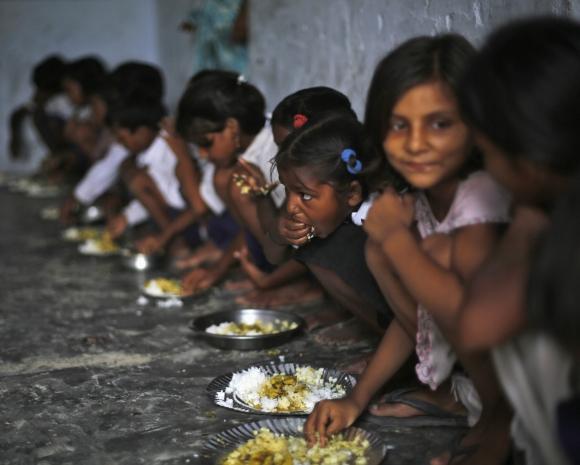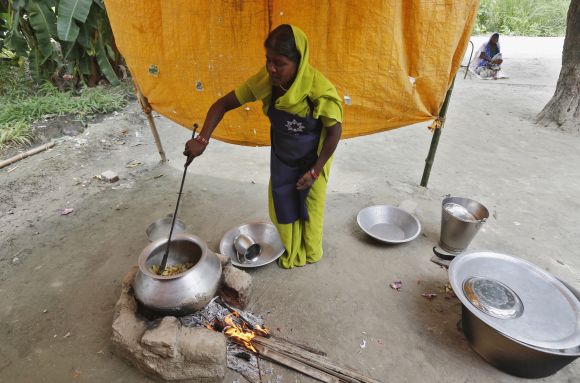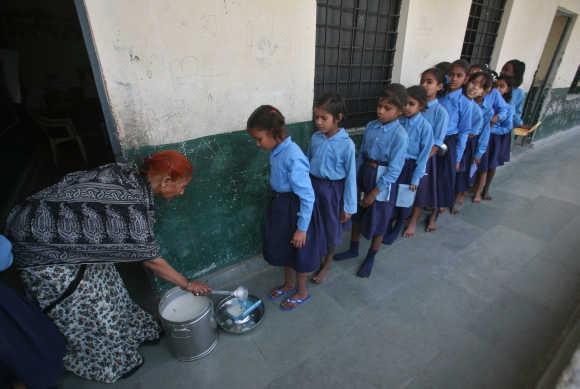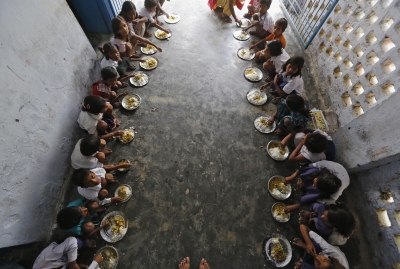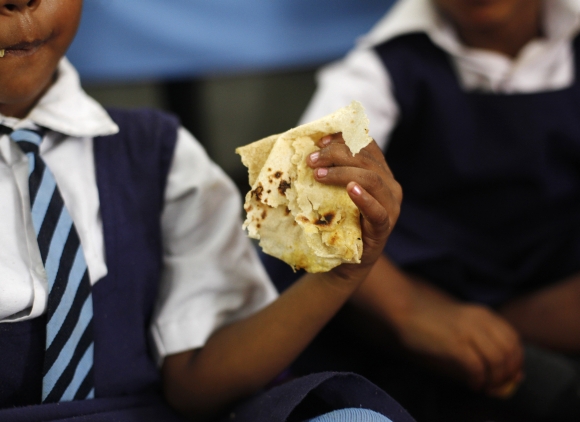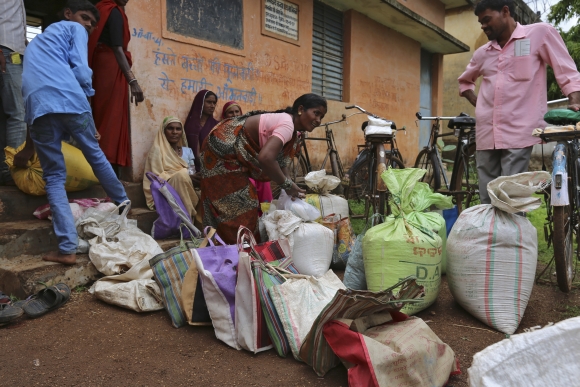 | « Back to article | Print this article |
Cooks feel 'risk not worth Rs 1,000 paid per month'
Neelbad was a poor village, till the moneyed residents of Bhopal began to buy land there to build farmhouses. There is nothing to indicate that this was once a village of farmers. Located just 10 km from Bhopal, it is all set to be assimilated into the Madhya Pradesh capital.
The poor of Neelbad send their children to the Government Middle School. It's housed in a solid single-storey building. Some classes have tables and benches; in others, the students sit on mats. The loos are filthy. Lunch is prepared every day for the 200 or so students who turn up. Earlier this week, one of the four cooks employed by the school ran away after the mid-day meal tragedy at a village in Chhapra in Bihar where insecticide in the food killed 23 children. Other cooks too feel the "risk is not worth the Rs 1,000 they are paid every month". If they too bolt, there will be no free lunch in the school; attendance, already at 50 per cent, may plummet to 10 per cent, teachers fear.
Schools, in cities, towns and villages, visited by Business Standard reporters in Uttar Pradesh, Madhya Pradesh, Delhi, Punjab, Karnataka and Tamil Nadu after the Chhapra incident show that the national mid-day meal programme, under which 120 million children across 1.2 million schools in India are served food every working day and for which the government earmarked Rs 13,215 crore in this year's Budget, suffers a serious crisis of credibility. Quality controls are few, hygiene is often poor. Nobody is ready to guarantee the quality -- cooks, teachers or principals.
Click NEXT to read further…
Teachers test food for students on stray dogs
At the school in Neelbad, teachers are reluctant to taste the food before it is fed to the children, even though the rules mandate that at least three adults, including the principal or a teacher, have to taste it first. Elsewhere in Madhya Pradesh, and also in Uttar Pradesh, teachers are testing the food on stray dogs and only then feeding it to the children. In Jabalpur, Madhya Pradesh, the Rajya Adhyapak Sangh has informed its members: "Never subject yourself to the experiment [of tasting the food]. Feed it to stray dogs that visit the school daily."
In Meerut (Uttar Pradesh), principals of government-aided schools have gone to the Allahabad high court after the district inspector of schools ordered that mid-day meals should be prepared on the campus and distributed by school principals. They contend that their primary responsibility is to focus on academics and they should not be burdened with the additional task related to mid-day meals. In Bihar, nearly 3,00,000 teachers boycotted the mid-day meal duty this week, leaving more than 15 million schoolchildren hungry. The teachers argued that feeding the children constituted non-academic work and was, therefore, not part of their job.
Parents too are taking no chances. Those who can are now sending their children to school with food from home. Fatima Khan is one of them. Her children study at the government school in Sarai Kale Khan, a south-Delhi settlement. She, like several other parents, has told her children not to touch the food served in school. Khan works as a domestic help, while her husband pulls a rickshaw. "We can squeeze another meal into our budget. But my brother, who studies in Class VIII, cannot," she says. He still relies on the mid-day meal for the 700 calories a day it gives him (for primary students, the entitlement is 450 calories a day).
Click NEXT to read further…
'First time we have seen them wearing apron, gloves while serving food'
Some non-government and charities that run centralised kitchens, mainly in urban areas, for dozens of schools are reaching out to the media with invitations to come and see their "state-of-the-art" operations. Supervision, at least here, has increased overnight. But whether this will be a lasting change is difficult to say -- the mid-day meal crisis, after all, does not impact the elite, so will it be a live issue three months later? At the 500-square yard kitchen run by Vishwakarma Education and Charitable Trust in Delhi's Wazirabad village, the employees put on gloves, aprons and tie handkerchiefs around their heads as they prepare the meal. Whether this is a daily practice or has been done for the benefit of the Business Standard team, which has landed after calling is difficult to tell. The kitchen today looks fairly clean.
V K Sharma, who runs the kitchen with his sister and her husband, says the government tests the food samples every month. He insists they have never received a complaint from any school about the quality of their food. The two teachers -- one of them a mid-day meal in-charge -- who his brother-in-law gets us to speak to on the phone say they are constantly in touch with the supplier and have no complaints. The food, halwa and chana, is not bad. But when it is delivered at the Sarvodaya Bal Vidyalaya in Paharganj, barely 40 children come forward to have it. Many bring their own tiffin. "It is safer," says one. Some students stand in a corner, giggling. "This is the first time we have seen them wearing an apron and gloves while serving the food," says another.
Click NEXT to read further…
Food comes with beedis, cockroaches, stones
Experts tell a different story. In Delhi, the national capital, where the scheme can be closely monitored, only 50 of the 280 samples taken from kitchens run by NGOs in 2012-13 met the basic standards of hygiene and nutrition. Eighty per cent of the food was below standard. Joint Operation for Social Help, or JOSH, which published a study this March that covered the mid-day meal scheme in six districts of Delhi, also found that food served to the children sometimes comes with beedis, cockroaches, stones and pieces of wood.
In remote areas, the scheme is being let down by poor infrastructure and lack of monitoring. Ideally, meals have to be prepared on the school premises and served to the students hot, healthy and fresh. For this, the school is supposed to have a kitchen and storage shed. But in a country of 6,00,000 villages where children continue to study under trees or in makeshift schools, a covered and clean kitchen remains a luxury. In Chhapra too, it emerged that the school was functioning out of a community hall and the principal was storing the ration in her house.
In 2004, on July 16 -- exactly nine years before the Bihar incident -- a fire in the thatched kitchen of the government-aided Sri Krishna Primary School in Kumbakonam, Thanjavur (Tamil Nadu), had killed 94 nursery and primary students. While the Centre has sanctioned close to a million kitchen-cum-sheds for schools, only 63 per cent of these were ready by April 2013. According to a report in Indian Express, despite the tragedy in nearby Chhapra, 70 students of Rajkiya Prathmik Vidyalaya in central Patna were found having the meal on a railway track 20 feet from their school, which did not have enough space to feed them.
Click NEXT to read further…
'Children tell me that they get sweat-soaked rotis'
At the Government Telugu Higher Primary School in Bangalore, which has 132 students from Std I to VIII, principal Venkata Ramanappa says lunch was previously cooked on the school premises but that had to be abandoned because storage of food and the low wages allocated for cooks under the scheme proved too problematic. The school then started getting food from the Akshaya Patra Foundation, which provides cooked lunch to 1.3 million children in 9,075 schools across nine states.
States like Punjab and Uttar Pradesh (which operates the largest mid-day meal network in India covering about 12.5 million children) have also roped in NGOs to run the kitchens. It is alleged that several NGOs belong to political leaders and their families. With less than Rs 10 per child per meal, the money in the scheme doesn't seem much. Even so, when the contracts open, there is a mad scramble for them. In 2007, Mumbai-based Biscuit Manufacturers' Welfare Association sent a proposal to the human resource and development ministry to introduce biscuits as mid-day meal. Such was the lobbying that about 30 Members of Parliament across parties wrote to the ministry making a case for biscuits as meal.
On November 30, 2012, a report by the Supreme Court-appointed food commissioners highlighted how the mid-day meal scheme was being hijacked by private contractors. The name of liquor baron (late) Ponty Chadha's company, Great Value Food, which had monopolised the programme in Uttar Pradesh, also featured in that report. It was found that in Karnataka, the entire contract was given to one company in violation of Supreme Court's orders. In Maharashtra, tender conditions, which stated that the company must have an annual turnover of Rs 1 crore, eliminated all mahila mandals (women self-help groups). The mandals that did get shortlisted were fronts for contractors.
"We have been trying to resist the entry of large contractors," says Harsh Mander, one of the Supreme Court-appointed food commissioners who formulated that report. "As for NGOs running centralised kitchens, there is no harm in that. But the time taken from getting the meal ready to dropping it to the last point should not be more than an hour," says Mander. In congested urban areas, with NGOs delivering food to more than 40 schools, this is not achievable. On days when puri is to be served, kitchens start making them the night before. "The food becomes stale and the rotis get soggy. Children tell me that they get pasine-wali (sweat-soaked) rotis," says Kavita Srivastava, national secretary of People's Union for Civil Liberties.
Click NEXT to read further…
5 kg pilfered from every 100 kg sack of grain
"For the scheme to be a success, the community has to get involved," says Vinod Raina, member, Central Advisory Board of Education, and one of the key architects of the Right to Education Act. "The Right to Education Act states that in every school management committee, 75 per cent of the members should be parents. Of these, 50 per cent should be mothers. But this structure is obviously not being encouraged.
Aruna Sharma, additional chief secretary of the panchayat and rural development department in Madhya Pradesh, says she found that in the entire Rewa district, mid-day meals were being prepared only on paper. And nobody complained!
NGO Madhya Pradesh Sangharsh Sajha Manch surveyed 121 schools and found that the quality of food fell as community participation slipped from 72 per cent in 2011 to 57 per cent in 2012. A recent study commissioned by the human resource ministry in Bihar and Uttar Pradesh also found that up to 5 kg is pilfered from every 100 kg sack of grain.
The time to clear the mess is now.
TOP photo features of the week
Click on MORE to see another set of PHOTO features...
